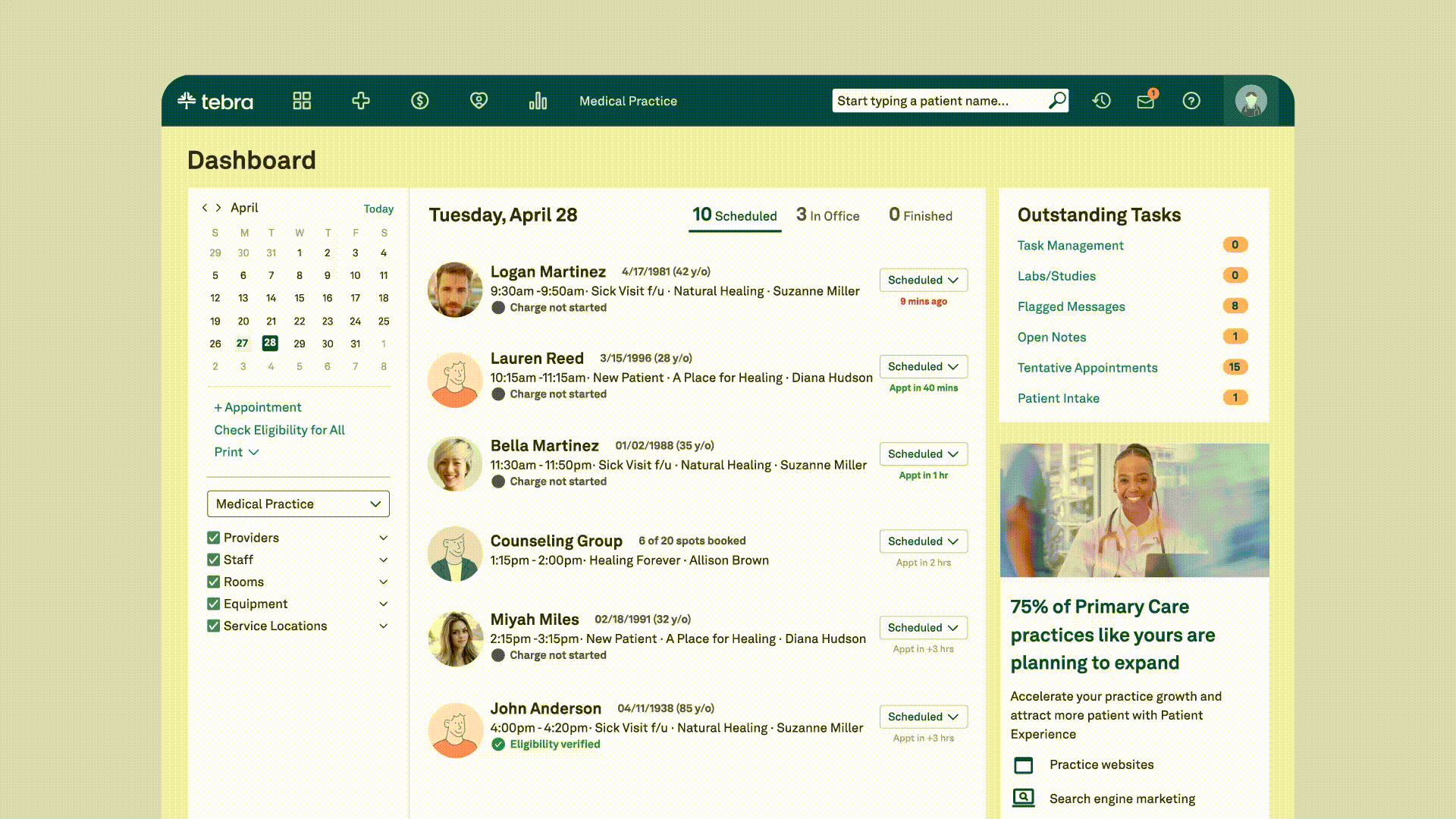The importance of certified EHR technology
Learn why certified EHR systems are essential for healthcare practices to ensure regulatory compliance, enhance care, and improve operations.

At a Glance
- Certified EHR technology is crucial for healthcare practices to ensure regulatory compliance, enhance patient care, and improve operational efficiency.
- Adopting certified EHRs enables medical practices to qualify for incentives and avoid penalties under the Quality Payment Program while meeting meaningful use requirements.
- While implementing certified EHRs can be challenging, especially for small and rural practices, the benefits of improved data security, interoperability, and care coordination make doing so a worthwhile investment.
While there are many ways to enhance healthcare quality, compliance, and efficiency, there’s one that works regardless of your practice size or specialty: leveraging a certified electronic health record (EHR). Certified EHRs have received a federal stamp of approval because of their ability to help your medical practice succeed.
In this article, we’ll explain why using a certified EHR is so important when selecting the right EHR, and provide implementation strategies for success.
Overview and history of certified EHRs
Various regulations preceded what we now recognize as certified EHR technology. Let’s take a moment to review the 20-year timeline and notable regulatory milestones.
2004: The Office of the National Coordinator for Health Information Technology (ONC) was established. ONC’s goal was to stimulate the use of computerized health records across the nation’s healthcare systems.
2007: The Institute for Healthcare Improvement’s Triple Aim framework laid the foundation for providers to improve patient care quality, reduce healthcare costs, and enhance population health in the United States. EHRs played a large role in these efforts.
2009: The federal government adopted the Health Information Technology for Economic and Clinical Health (HITECH) Act to promote interoperable health information technology and regulate the secure transmission of health information.
2010: EHR adoption began to ramp up as ONC issued its Standards and Certification Criteria Final Rule for EHR systems. In addition, the Centers for Medicare and Medicaid Services (CMS) finalized its definition of "meaningful use" of EHR technology and began to introduce EHR incentive programs that required the use of certified EHR technology.
2015: The Medicare Access and CHIP Reauthorization Act of 2015 (MACRA) supported the transition from fee-for-service payment models toward value-based care.
2016: The 21st Century Cures Act focused on improving patient access to electronic health information, promoting information sharing, and establishing anti-information blocking provisions.
2017: Physicians were given clear pathways to participate in CMS’ newly launched Quality Payment Program: the Merit-based Incentive Payment System (MIPS) and the Alternative Payment Model, both of which require certified EHR technology.
2022: The Trusted Exchange Framework and Common Agreement (TEFCA) began to support the nationwide exchange of electronic health information across health information networks. In addition, CMS announced a new reporting option to fulfill MIPS requirements: MIPS Value Pathways (MVPs).
Regulatory standards and compliance
While there's been a federal push for the use of certified EHRs, not every EHR vendor offers an ONC-certified product. However, partnering with one that does is the best way for your medical practice to ensure compliance with current and future regulations such as HIPAA, information blocking prevention, and price transparency requirements.
A certified EHR also helps your medical practice qualify for incentives and avoid downward payment adjustments under the Quality Payment Program. It provides the technical capabilities you need to collect and report the right data to CMS.

Key benefits of certified EHR technology
Using a certified EHR system benefits your medical practice in many ways. For example, it:
- Augments privacy and security. Certified EHRs comply with all HIPAA rules and regulations to protect patient information. For example, they include multi-factor authentication, end-user device encryption, automatic access time out, access control, and more.
- Enhances patient safety. With computerized physician order entry, drug-drug and drug-allergy interaction checks, clinical decision support, and more, certified EHRs help you provide safe, high-quality patient care.
- Enriches quality measure reporting. With certified EHRs, you can record, export, import, calculate, report, and filter clinical quality measures.
- Heightens patient engagement. Certified EHRs help you improve patient and provider interaction and communication through patient portals, secure messaging, and other features. You can provide patients with easy, secure access to their health information and financial estimates as well.
- Improves care coordination. By promoting interoperability, certified EHRs let you exchange data with other providers and entities. They also store data in a structured format. This means you can easily retrieve and transfer patient information to a variety of entities (e.g., immunization registries, public health agencies, and cancer registries). You can also coordinate care among different providers and hospitals.
- Increases productivity and workflow efficiency. Certified EHRs include e-prescribing, care plan templates, electronic patient care summary delivery, and more — all of which save time and reduce burnout.
Meaningful use of certified EHR technology
“Meaningful use” means using certified EHR technology to meet specific objectives to share and exchange health information. The federal government created this definition to ensure providers use EHRs not just for the sake of using EHRs, but to actually improve patient care. That’s why meaningful use is a requirement to participate in the Quality Payment Program and to receive financial incentives and rewards. Note that the Quality Payment Program is updated annually. Here are the 2024 updates.
Why choose certified EHR systems over non-certified systems?
As of 2021, nearly 4 in 5 (78%) provider practices had adopted a certified EHR. These numbers will likely continue to grow as medical practices become more aware of the advantages of certified EHR technology. As data breaches continue to ramp up, independent medical practices are particularly vulnerable, and certified EHRs help ensure data security and patient privacy.
“As data breaches continue to ramp up, independent medical practices are particularly vulnerable, and certified EHRs help ensure data security and patient privacy.”
In addition, certified EHRs integrate with other health information technology systems. This can be extremely beneficial for medical practices in accountable care organizations and other arrangements that prioritize care coordination, data exchange, and cost reduction. Non-certified EHR systems may not include the same features, which could leave your medical practice unable to meet strategic goals, remain competitive, or contribute effectively in the larger healthcare ecosystem.
Tebra's EHR is an ONC-certified all-in-one platform built for independent practices. Learn more.
Overcoming barriers to adoption
With that said, small and rural medical practices face unique challenges when it comes to adopting certified EHR technology. Cost is perhaps the most significant barrier. This includes expenses associated with the purchase, implementation, and ongoing maintenance. The good news is that the federal government offers grant programs and subsidies designed to offset the financial burden for small and rural healthcare providers.
Regional extension centers may also be able to provide technical assistance and guidance to ensure these medical practices can implement and use certified EHRs. There are also plenty of additional resources that can help medical practices understand costs and establish a budget.
Looking ahead
If your medical practice doesn’t currently use a certified EHR, there’s no time like the present to switch. Or if you do — and you want a solution that meets your needs more effectively — consider starting the research process. Finding the right certified EHR takes time, but it's a necessary step to improve patient care and ensure a secure financial future for your medical practice.
You Might Also Be Interested In
Are manual processes limiting your growth? Get actionable steps to eliminate administrative burdens with Tebra’s free guide to practice automation.
Subscribe to The Intake:
A weekly check-up for your independent practice

Suggested for you
Get expert tips, guides, and valuable insights for your healthcare practice










